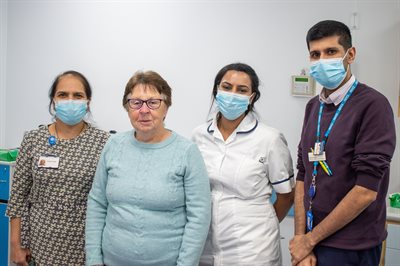NGH uses 3D printer to create amazing mask to help treat skin cancers

L-R Dr Deepali Vaidya, Susan Galloway, Bansi Mulji-Shah and Maulik Darji.
Specialists at Northampton General Hospital are using a 3D printer to create special masks to target skin cancers without the need for surgery.
In 2021 the hospital introduced Skin Brachytherapy - a highly targeted radiotherapy technique used to treat certain types of basal cell or squamous cell skin cancers.
Treatments are carefully individualised for each patient and – because the treatment spares surrounding healthy tissue from radiation – can be used instead of surgery and lead to a more rapid recovery with good cosmetic outcomes.
Last month (January), for the first time, the hospital used a highly specialised 3D printer to create a customised face mask for a patient with a skin cancer on her nose which otherwise would have needed a surgical intervention, and probably plastic surgery.
Service Improvement Skin Project Lead Bansi Mulji-Shah said: "We have used the 3D printer to print a customised face mould for this patient and deliver brachytherapy (a form of radiotherapy) to the skin.
“Due to the shape of the skin cancer on the patient's nose, it would have been very difficult to treat her cancer with traditional methods of radiotherapy. The alternative would have been to offer the patient surgery that would have meant extensive cosmetic changes, which the patient declined.
“With this new customised method, using the 3D printer, we are able to treat her cancer with radiotherapy without the extensive cosmetic side effects.
“With special thanks to our physics team (Stuart Duggleby, Stuart Tomlinson, Ahmar Yaseen and Steven Stibbs), essentially the printer creates a plastic mask filled with tissue like material. The mask is printed with millimetre tube holes which we used to deliver radiation to specific points and depth with sub-millimetre accuracy and to the precise part of the skin the cancer is on.
“Over a series of treatments the skin cancer cells are destroyed without the invasive need to cut into the skin.”
NGH Clinical Oncologist, Dr Deepali Vaidya, said: “Squamous cell carcinoma and basal cell carcinoma are the most common types of skin cancer and affect about 1,000 people in Northamptonshire each year.
“They are highly curable - and less dangerous than melanoma - but can be disfiguring and costly to treat and using surgery or other forms of more extensive radiation therapy.
"The new treatment is a better option for many patients and using the 3D printer mask helps us to target it very precisely indeed, particularly for those with skin cancers with difficult shapes or in difficult places.
“It is also be a better treatment option for elderly patients, who don't heal as well, or patients with cancers on the nose, ear or eyelid where multiple surgeries whilst achieving comparable treatment outcomes"
First patient is pleased with ease and precision of new treatment
The first patient to receive the new treatment was Susan Galloway, 76, from Duston, Northampton.
She was diagnosed with skin cancer on her nose last year and agreed to having radiotherapy with the new 3D printer mask in January.
Mrs Galloway, who is widowed and has three children and eight grandchildren, said: “They made some very precise measurements and fitted me for the mask.
“I have received eight treatments which started on January 16 and were finished on January 26.
“From start to finish it was about 20 minutes for each treatment and I had to grip a tube with my teeth which was a bit awkward, but OK. Afterwards you feel the effects of the radiotherapy and your nose is a bit sore but the skin cancer cells are killed which is what you want.
“I think if you need this kind of treatment you should have it. There is very little inconvenience and you can get rid of your cancer.”
Mrs Galloway has had a follow-up appointment and is doing well.
NGH is now working on expanding the service using 3D printers to create custom fitted applicators for more complex and advanced skin cancers.
It aims to raise awareness of this treatment option to both local healthcare professionals and patients of its availability.
Posted on Monday 12th February 2024